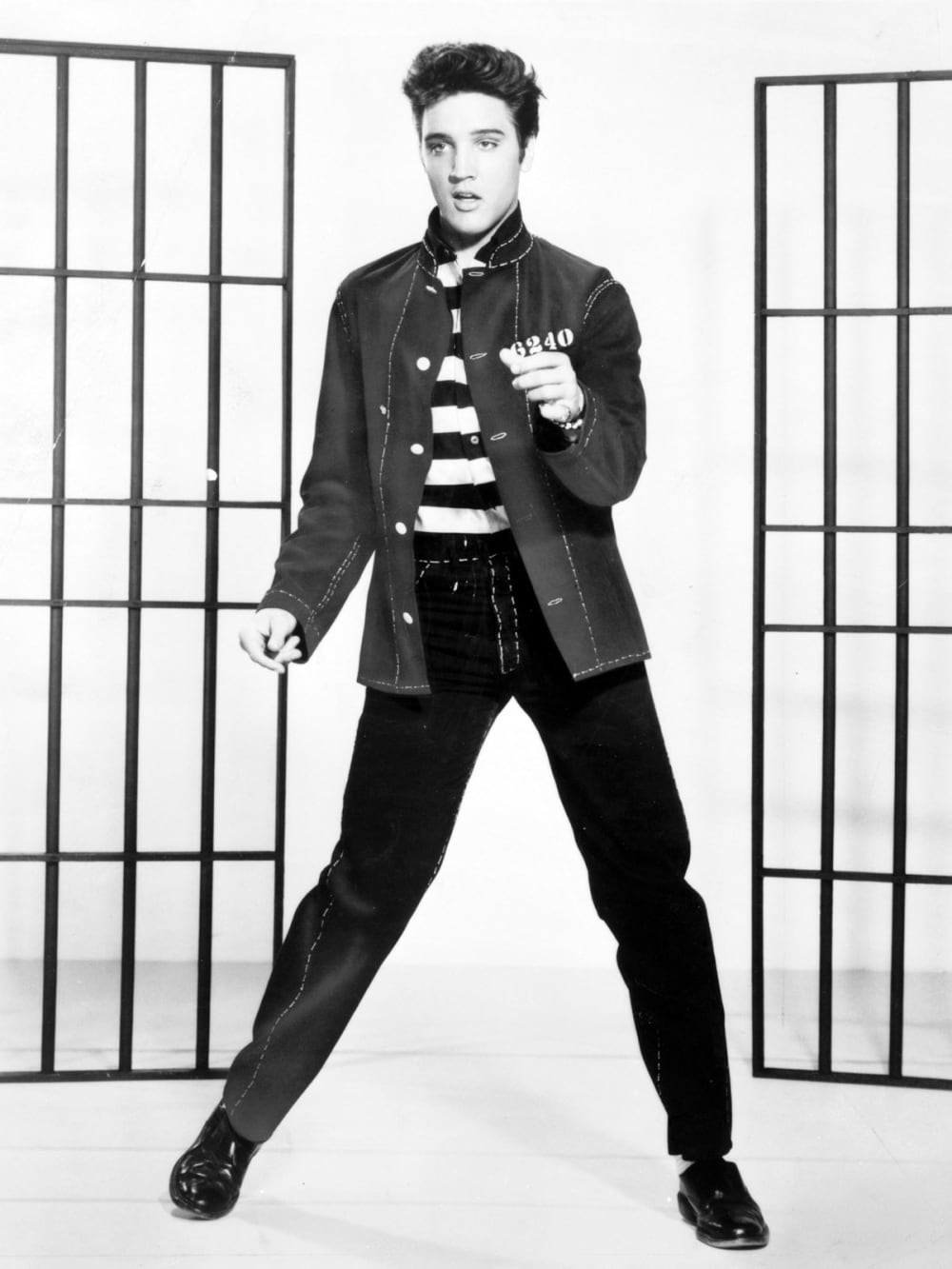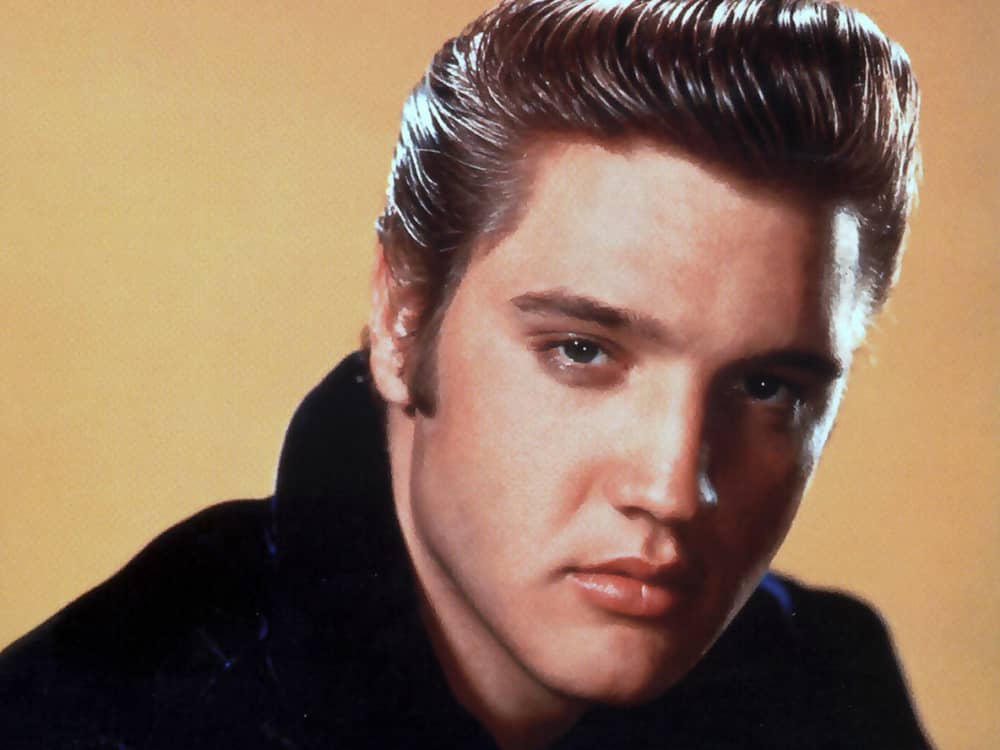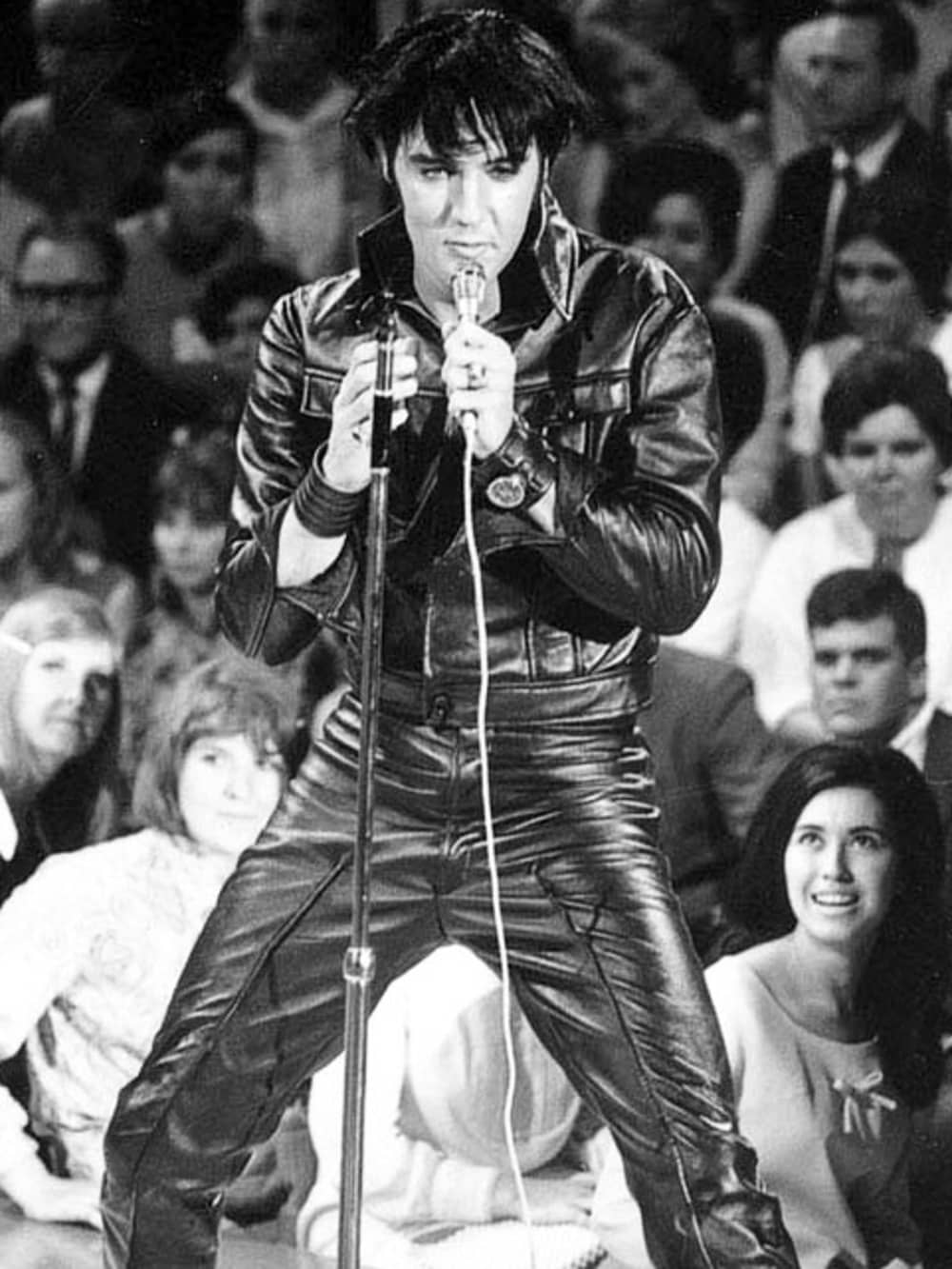 The 1957 publicity poster for "Jailhouse Rock"
The 1957 publicity poster for "Jailhouse Rock" Portrait of The KingPhoto courtesy of Elvis Presley Estate
Portrait of The KingPhoto courtesy of Elvis Presley Estate Donning a Western look
Donning a Western look The famous "Comeback Special" performance in 1968
The famous "Comeback Special" performance in 1968 Elvis in "Aloha From Hawaii," broadcast live via satellite on Jan. 14, 1973
Elvis in "Aloha From Hawaii," broadcast live via satellite on Jan. 14, 1973 "Elvis 75"
"Elvis 75"
Elvis Presley, who would have turned 75 today, has maintained his singular place in popular culture primarily because of his uncanny versatility. Start with the voice. Though a natural tenor, Elvis could rock a convincing baritone; his range was that sprawling. He could sound by turns raunchy or sweet, often within the same phrase, and his timbre is so distinctive that a well-versed two-year-old can pick out his voice unprompted.
Then there's his musical output. Few performers of Elvis's stature have recorded such a broad array of music. Though the Tupelo, Mississippi native never abandoned the country blues, he issued forays into country, R&B, gospel music, ballads, and, later, lounge music. Though he can take little credit for inventing the sound - Carl Perkins had already fused the blues and country music, Ray Charles had already made gospel into R&B, and Fats Domino, Little Richard and Chuck Berry had already made the blues rock before Elvis cut his first single - Elvis was the "King of Rock and Roll" because the music would never have taken the wide ranging form that it eventually would without his meandering influence.
Elvis's vocal and musical versatility led to a thematic richness that would characterize popular music in the second half of the 20th century. It's hardly a feat to establish a cult of the young in the modern world, but Elvis elevated the brute fact of teenage horniness to a movement that would reverberate throughout the pop firmament during the '50s and '60s until merged with other, more potent strands of culture to become the youth rebellion movement that had such a noisy year in 1968.
But unlike many of his contemporaries, Elvis wasn't thematically limited to his own libido. He played dis songs ("Hound Dog"), spirituals ("How Great Thou Art"), torch songs ("I Need Somebody to Lean On"), and depraved fusions of the spiritual and the sinful. (Those who are shocked by the way gospel music infiltrates "Viva Las Vegas" - "Bright light city gonna set my soul on fire" - should recall that black preachers had hardly cornered the market on such metaphors. Think of Jerry Lee Lewis, Elvis's colleague on Sun Records. Like Jerry Lee, Elvis conceals an ambiguity in his religious language: When your soul is on fire, it's usually because you're in Hell.) Later, Elvis would churn out ballads ("Suspicious Minds," possibly his finest moment), stabs at political relevance ("In the Ghetto"), and stabs at political irrelevance (Jerry Reed's ineffable "U.S. Male").
To be sure, Elvis never wrote his own material, but his voice and his persona provided a site for this smattering of themes to cohere. He became the contextual backdrop to the elaborations that popular artists would contribute to these themes for the rest of the century.
Of course, Elvis's versatility was not limited to his artistic endeavors. He also provided a template for the great American celebrity scandal. His early career met with protests from southern bigots who despised his frank sexuality - the famous admonition that Elvis should only be filmed from waist up - and harbored related anxieties about black music and miscegenation.
Ironically, several decades later, the spiritual descendants of these bigots would seize upon Elvis as one of their great cultural symbols and black radicals would denounce Elvis's fusion of black and white music. Chuck D's allegations notwithstanding, there is little in the historical record to suggest that Elvis was actually a racist, but these sorts of myths, misunderstandings, and reversals are also part of the American celebrity experience.
And scandal would follow Elvis into his later years. His career fell into the hands of the enigmatic Dutchman Colonel Tom Parker (né Andreas Cornelis van Kuijk), who would become America's most notorious Svengali. The Memphis Mafia, Elvis's infamous retinue of bodyguards, was one of the first entourages. Then there were the years of reclusion - like J.D. Salinger or Michael Jackson - when Elvis shunned the press. Graceland itself was pretty weird, a twisted reflection of genteel Southern fussiness, shone through the prism of poverty.
The seventies brought drug-induced comas and a staggering shadow of Elvis's past persona. A bloated Britney Spears mumbling her lyrics live on MTV has nothing on fat Elvis in a sequined jump-suit stumbling around a Las Vegas stage. Ultimately, Elvis fell prey to the most tragic celebrity scandal of all: the drug-overdose death. Pills, in his case as in that of Michael Jackson.
His versatility aside, what's strikes you when you listen to "Elvis 75: Good Rockin' Tonight," the essential four-disc box set commemorating his 75th anniversary, is Elvis's stunning consistency.
Those given to a certain purism, this writer included, have long praised Elvis's "Sun Sessions," those early recordings that were the bedrock of his career and of the rockabilly genre. We have tended to dismiss the Elvis that returned from the Korean War to slick superstardom as the sort of crass culture machine garbage that punk rock was supposed to smash.
Call it a longing for authenticity, or whatever you want, but we were wrong. Even the schmaltzy Vegas period at the end of his life has its virtues. If such a music has its merits, and this writer thinks that it might, then you can rank Elvis as a minor light: better than Wayne Newton, not quite as good as Neil Diamond. Though his musical language might have changed throughout his career, Elvis continued to kick ass.
A great strength of "Elvis 75" is its chronological arrangement. Listen to the set in order, and you can hear Elvis evolve across the decades. And the tracks don't bog down; the song selection was made judiciously but with enough room for nonessential surprises. The first disc, for example, has tunes as well known as "That's All Right," "Good Rockin' Tonight," and "Mystery Train," but also Elvis's cover of "I Got a Woman," Ray Charles's breakout soul number that provided the raw material for Kanye West's "Gold Digger." Most listeners know "King Creole," but how many have overlooked "Bossa Nova Baby"?
"Elvis 75" offers little for the Elvis completist, but it helps the rest of us understand why such a person might exist. At the very least, it's a fitting way to celebrate the King's birthday with the rest of the world.
SAMPLE THE KING:
Adobe Flash Required for flash player. "In the Ghetto"
Adobe Flash Required for flash player. "I Got a Woman"
Adobe Flash Required for flash player. "Bossa Nova Baby"
Rick Sawyer is a refugee from Houston who lives and writes in Boston, Mass. A former KTRU music director and disc jockey, he still writes "Texan" on his tax forms.
